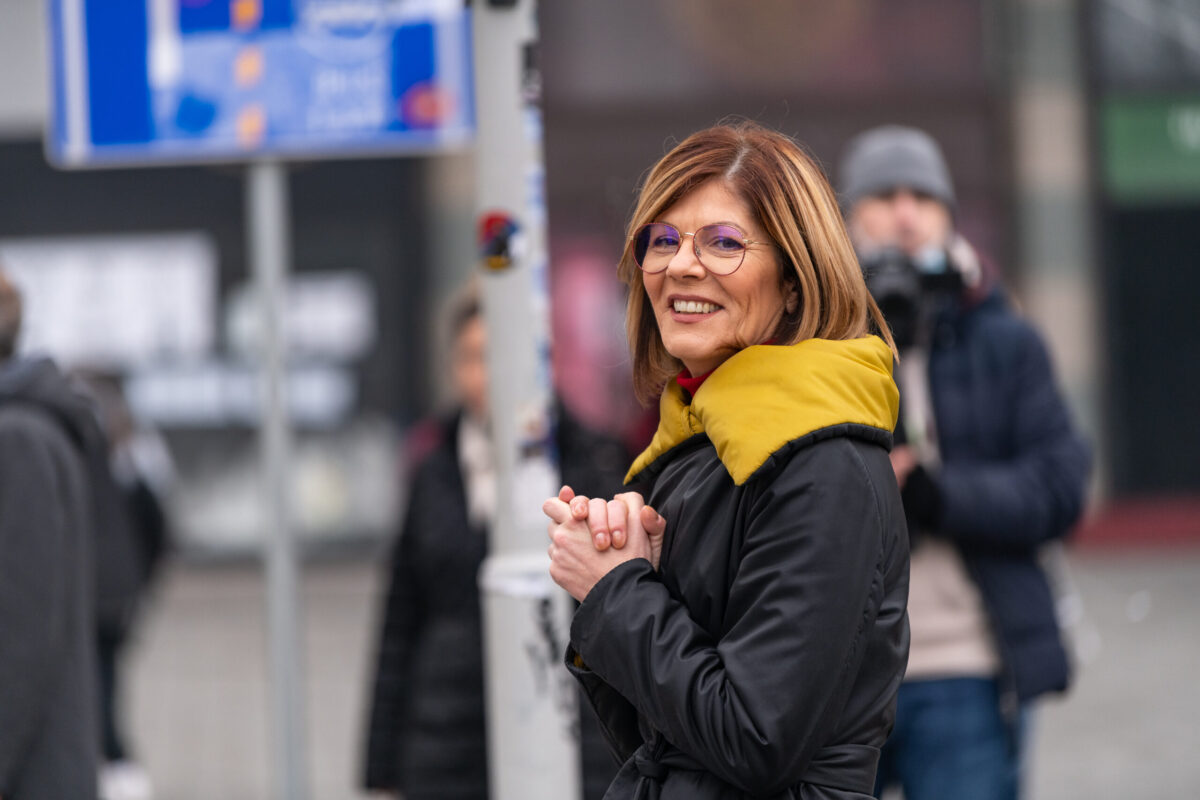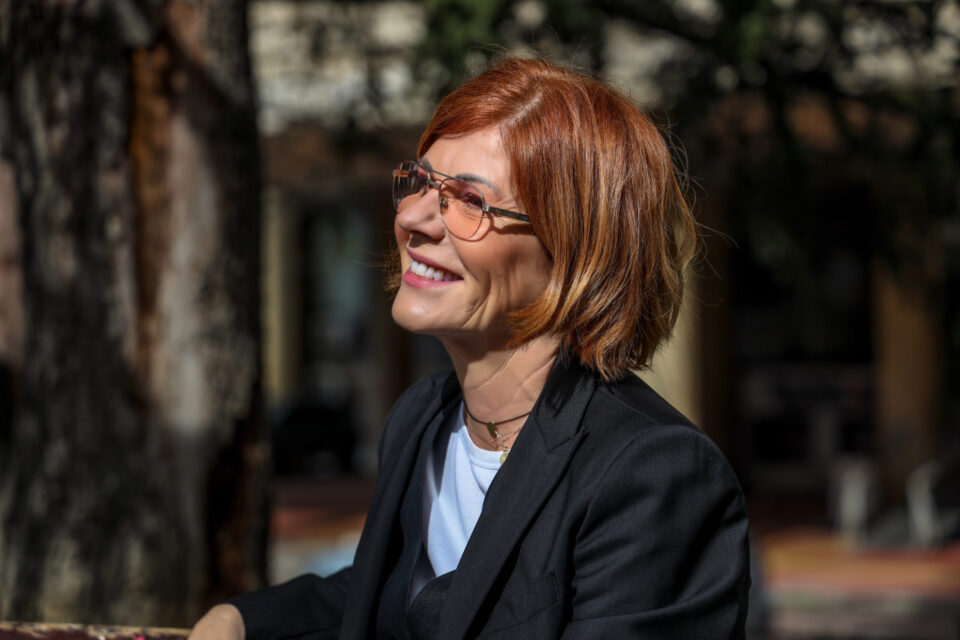People in Belgrade deserve to hear answers not only to the questions that the government wants to answer
 Since the beginning of her career in television, journalist and presenter Rada Djurić has been deemed “the voice of the people.” As the presenter of the Morning Programme and Belgrade Chronicle on the Serbian Broadcasting Corporation (RTS) and the Medju Nama show on Nova S, she is known for asking state officials very uncomfortable questions that other journalists were not even allowed to think of. Later, she hosted the Da Sam Ja Neko show on N1 in which she talked to ordinary people in the streets of Belgrade and throughout Serbia, even in New York City. Our reason for interviewing her is that her voice and opinions are valued and respected.
Since the beginning of her career in television, journalist and presenter Rada Djurić has been deemed “the voice of the people.” As the presenter of the Morning Programme and Belgrade Chronicle on the Serbian Broadcasting Corporation (RTS) and the Medju Nama show on Nova S, she is known for asking state officials very uncomfortable questions that other journalists were not even allowed to think of. Later, she hosted the Da Sam Ja Neko show on N1 in which she talked to ordinary people in the streets of Belgrade and throughout Serbia, even in New York City. Our reason for interviewing her is that her voice and opinions are valued and respected.
You have been some of the best-known faces of RTS for a long time, but you left the public broadcaster at the time when it became part of the ruling regime’s propaganda machine. What was the reason for departure? Did you have an inkling back then in which direction the public broadcaster was moving?
Ultimately, the simple answer would be “yes”, but it would not be entirely correct. I found myself in a situation where I had to choose between leaving or getting sick. None of what I was taught, how I perceived the public broadcaster and tried to work accordingly was no longer possible so I left. But making that decision was far from simple.
For 30 years, I witnessed both the rise and fall of RTS. Everything that people talk about and suspect is difficult to explain if you are not part of that system. Both self-censorship and censorship here are much more subtle than in other media. On the one hand, RTS has always been synonymous with great television, in every sense, while for many, at the same time, it is wishful thinking and a definite disappointment. The viewership and influence are incomparable to all other channels. No matter what RTS has always been authority above all authorities, but was also trusted by the public. This kind of authority can be intoxicating and people often think that they are very important, essential and irreplaceable. RTS is a large system where you can always be invisible if you want and at the same time feel secure. The dissatisfaction of the RTS employees was mainly due to low salaries (which has been a chronic problem all these years and is not accidental) and due to editorial policy. Most importantly, there has never been political will for RTS to become a truly public broadcaster. The introduction of subscription, as a guarantor of independence of every kind, has always been more of a demagogic move, a means of manipulation and a pre-election promise. There has never been a true intention that would benefit both the viewers and employees the most. Every government viewed RTS as an important prey and the RTS employees have been treated as usual suspects, sometimes justified, sometimes unjustified.
The public broadcaster’s role has never been clearly defined. Everyone has interpreted it and continues to interpret it as they see fit. I still believe to this day that without a clearly defined role of a public broadcaster, there is no clear role for other TV channels too, especially those who broadcast on national frequency. It is devastating that the government has a reserve national frequency which is used to threaten and discipline the public broadcaster.
Media freedom seems to be our main conversation topic when we talk to journalists. Does our society have media freedom and how do you feel as a journalist – free or not?
Freedom, from personal to media, is always a matter of choice. These choices could be wrong, but the more choices we have, the more intense the feeling of freedom is. Right now, I feel freer than before, but there are increasingly fewer people with whom I can share my freedom. Every conquest of freedom has its price. Fortunately, my closest environment consists of people similar to me and even those who only recognize or remember me from better times. I thank them for that. Speaking of freedom, I often draw a parallel between abused women and men and our entire society. There is no essential difference. Everything starts with lovely promises and a feeling of mutual belonging and respect. Those people who think that persons who suffer abuse can make a simple choice and that just making a choice is enough to get out of that vicious circle maybe should reflect on how ready they are to face their own traumas, humiliations and false assurances.
Every conquest of freedom has its price
All the traumas that we have collectively experienced and never faced as a society systemically, force us to remain the biggest victims who will in every way try to rationalize the situation we are in – wars, poverty, job loss, incompetence, waiting at hospitals, waiting for justice to be served, waiting to be paid, waiting for pension, waiting for welfare assistance… Today, in the 21st century, we depend on the state and individuals in power to give us the money we earn, not for what we need, but for what, when and how much they decide. Institutions are no longer our safe houses and even if they are, once we leave them, another abuser is waiting for us. when be, when we get out of them, a new abuser is waiting for us. The choice to step forward becomes more and more difficult – a new normal is established in which both “foreign” and “domestic” wage earners become mere observers of their fate. So, having a choice is the solution and prerequisite for all freedoms, including media freedom. It is not easy, but it is doable. We have to help each other.
Your programme – Da Sam Ja Neko (If I Were Somebody) – gave a strong voice to ordinary people, people we meet in the street, our neighbours. How important is that voice to be heard today? Where do you find inspiration for the many people you talk to and the places you visit?
My programme gives a voice to people who are ready to step forward. I wanted to show myself and others that not everyone is the same and that it’s not scary if you publicly express your opinion. We made 500 shows and talked to 600 of the most diverse people in Serbia, of various professions, social status, age and interests, and ideological and political orientations in the past three and a half years. They are the proof that things can change and that change is worth it. It is never black and white, us versus them, ours and theirs. I don’t believe in ME. WE always win. That is also the answer to the question of where we find our interlocutors and what motivates us – that is me and the whole team.
Do you think that the authorities (not only in our country but everywhere) listen to ordinary people – workers, farmers, artists?
They hear, but they don’t listen. On the other hand, the authorities, not only in this country, are so far away that maybe it’s time to stop shouting as they certainly won’t hear us. Screaming is not a solution either. It lasts a short time and you quickly run out of breath. There is one frequency to which even the most distant people are not immune and it’s marching. The sound is not excessively powerful, but it is strong and constant. Like marching feet, your own or someone else’s. It doesn’t matter. They are heard best in silence.
Who would you like to interview next and what would you ask them?
I want to ask those who think they are someone very important and hence act only from a position of power, what they would do if they really were as important as they think they are. It would be good to hear from them what they would do if the power and force were taken away from them. The list is quite long.
Ignorance has always been the only danger
To what extent are the modern digital age, life on social networks and artificial intelligence a danger to journalism and society as a whole?
Ignorance has always been the only danger. Ignorance creates fear of the unknown and fear of the unknown in turn leads to loss of control, both over ourselves and technology. We as a species will either return to factory settings or we will not exist. But who still thinks about the future when we suspect everything, except lies? That’s how the lies remain unquestioned, despite everyone claiming they can spot one straight away. Little by little, it imperceptibly disguised itself as the truth and now roams the world and the Internet unhindered.
As a journalist, do you miss covering urban, communal topics in Belgrade and do you think, as a citizen, that people in Belgrade are well informed about the developments in their city?
For a long time, I covered topics that are of public interest to the people living in Belgrade. I miss their energy, their questions and their requests. I miss our partner relationship of trust and the feeling that we have fixed something with joint effort. People in Belgrade deserve to hear answers not only to the questions that the government wants to answer. They know very well how to recognize who is working for theirs and who for personal interests, which is why it is high time that they get what they deserve and what they pay for in the end, which is an accurate, true and clear picture of the city they live in, with clear rights and responsibilities, both their own and those who decide on their behalf. This must not be their choice, rather it should be the rule.
